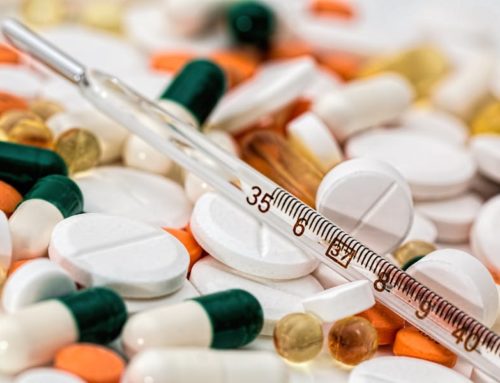When you start patients on a parasite cleanse, they may experience new emotional symptoms they find confusing or even embarrassing to talk about.
Yes, parasites can trigger emotional issues. This has been termed “Parasite Manipulation” where parasites modify their host’s behavior to increase their protection in the body. It’s nothing patients need to be ashamed or embarrassed about. However, more studies are needed to see how parasites manipulate human hosts and the overall effect they have on humans. (1, 2)
Parasites can cause die-off responses in your patients as they are forced out. Since these critters are prone to resist, this process can inflict emotional strain on the host. (3)
However, with holistic, foundational healing, remind your patients that sometimes they’ll feel worse before they get better because the focus is getting to the core of the health issue rather than just treating the symptom.
It’s not just about eliminating parasites. It’s about getting patients back to long-term, sustainable health that refortifies their immune system’s natural defenses.
In order to relay to patients what can happen to them emotionally during a parasite cleanse, it’s crucial to understand what parasites may do to the host body that causes these concerns and to provide natural strategies for your patients to conquer these challenges.
Parasite Activity in the Body
Parasites change the environment of their host’s body — including the neurotransmitters of the brain — to help ensure their survival. The brain’s neurotransmitters affect them because there are receptors on their bodies that can read these chemical signals. (4, 5)
The body’s neurotransmitters may disrupt the parasites’: (4, 6)
- Ability to attach themselves
- Ease of feeding
- Muscular coordination
- Reproduction
To protect themselves, these critters try to decrease and subvert neurotransmitters that inhibit their activity. These alterations can change the way people think and feel. (7)
For example, researchers are starting to rethink what conditions lead to depression. More and more evidence points to parasites by possibly disrupting mechanisms in the body in ways that could lead to depression. These include: (3)
- Creating a large amount of inflammation
- Depleting nutrients needed for a healthy emotional state
- Interfering with neurotransmitter levels
Parasites can also trigger other intense feelings. Among these are explosive anger and aggression towards oneself or others. They can also provoke impulsive behavior. (8)
As patients do a parasite cleanse, the parasites will double their self-protective efforts, which can temporarily worsen emotional symptoms. Remember to remind patients that it’s not their fault and that their neurotransmitter levels should return to normal after they’ve eliminated the parasites. (9, 10)
Parasites and Neurotransmitters
Parasites either alter, inhibit, or steal several neurotransmitters to get what they want. These include acetylcholine, dopamine, GABA, and serotonin.
Acetylcholine
This is the main neurotransmitter of the parasympathetic nervous system. It’s also known as the “rest and digest” branch of the system and functions without conscious control. It can increase gut motility, relax blood vessels, and slow heart rate. (11)
Acetylcholine, or ACh, also plays an essential role in many brain functions. These include memory and learning. (12)
Parasites and Acetylcholine
Parasites break down acetylcholine and use it as food because they’re dependent on this neurotransmitter for nourishment. Plus, this prevents stimulating the immune system to get rid of them. (13, 14, 15)
What’s more, inhibiting acetylcholine causes blood to be a little thinner, which makes it easier for blood-feeding parasites to sustain themselves. (15)
Acetylcholine helps move the bowels, which could expel the parasites. It also makes it harder for pathogens to create a biofilm in the body. So, by feeding on acetylcholine, parasites can continue to thrive in their host’s body (16, 17)
Symptoms of Low Acetylcholine
If patients are low in this neurotransmitter, it may lead to: (18, 19)
- Brain fog and memory issues
- Increased inflammation, especially in the gut
- Less rapid-eye-movement (REM) sleep
- Muscle weakness
Poor sleep may leave patients feeling drained and moody. It may also contribute to learning and memory issues. (20)
Dopamine
This neurotransmitter affects motivation level and reward-seeking behavior. Dopamine is often associated with the “pleasure system” of the brain, which provides feelings of enjoyment and exhilaration. It also slows the intestines and reduces lymphocytes to lessen their activity. (21, 22, 23)
Parasites and Dopamine
Parasites typically raise dopamine levels. This rise in dopamine calms the immune system so it’s less likely to recognize that there’s a threat. That way, the parasites can infiltrate the immune cells to travel undetected. This enables them to enter the brain and pass the blood-brain barrier and prevents the immune system from fighting back. (24, 25)
The parasites’ efforts to raise the body’s dopamine levels also delays stomach emptying. By slowing the gut movement, they’re less likely to be evicted from the intestines. (26)
Lastly, parasites need dopamine as part of their life cycle to reproduce. (27)
Symptoms of Excess Dopamine
Even though dopamine is needed to be healthy, too much can lead to some serious issues. An excess of dopamine may cause: (28, 29)
- Anxiety
- Aggression and agitation
- Constipation
- Depression
- Hyperactivity
- Increased stress
- Insomnia
The specific effect of high dopamine depends on the location in the brain where there’s an excess. For instance, in some areas it may lead to depression while in other parts it may trigger agitation. (29)
Genetics also play a role. Too much dopamine is associated with bipolar disorder and schizophrenia in some people. (29)
GABA
This neurotransmitter — known as gamma-aminobutyric acid — helps people feel calm. GABA relaxes the mind and reduces anxiety while also promoting good digestion, gut motility, and reducing brain inflammation. (30, 31)
Parasites and GABA
Parasites have a unique relationship with GABA. While GABA may provide calm, if it attaches to parasites’ GABA receptors, it paralyzes them. So, the parasites release chemicals to prevent GABA from attaching. (32)
Yet, research shows parasites can use GABA as a carbon food source, specifically with protozoan parasite Toxoplasma gondii. This parasite will use this neurotransmitter to help increase their own metabolism, which then damages certain receptors in their host’s brain that could cause seizures in some patients. (33)
Reducing GABA can also affect gut motility to eliminate the parasites in stools. Parasites will respond to the hosts efforts to kill them via a cleanse by attacking the GABA neurotransmitter and damage more of these receptors. (34, 35)
Symptoms of Low GABA
Low GABA levels may contribute to many issues, particularly mental health challenges. A shortage of the neurotransmitter alters the brain chemistry and wires it for anxiety and depression. (36)
Additionally, a shortage of this nerve messenger may result in anger because GABA regulates these emotions in the brain. (37)
Other possible effects of low GABA include:
- Addictive behavior (38)
- Attention deficit (hyperactivity) disorder, also known as ADD or ADHD (39)
- Depression (40)
- Headaches (41)
- Inflammation and chronic pain (42)
- Insomnia (43)
- Lack of empathy (44)
- Low stomach acid (45, 46)
- Panic attacks (47, 48)
Serotonin
Serotonin helps people feel happy and reduces anxiety. The body produces 90% of this neurotransmitter in the gut. It also helps control appetite, promote good intestinal flow, and regulate sleep, plus aids learning and memory creation. (49, 50)
Parasites and Serotonin
Parasites have receptors for serotonin just like people do. In parasites, serotonin: (51, 52)
- Enhances their ability to eat
- Helps them reproduce and spread in the body
- Stimulates muscles, allowing them to move more
When parasites steal serotonin, the body will sense a serotonin deficit, which then signals the brain to eat to create more of the neurotransmitter. Parasites love sugar. They thrive off of glucose-rich blood to function, which can trigger carb cravings in the host. (53, 54, 55, 56)
Parasites also attempt to inhibit serotonin because of its role for autocrine, endocrine, hormonal, and paracrine actions in the gut. When the body senses a gut irritant or pathogen, it gives the intestines a quick burst of serotonin to speed up gut motility. Slowing down the gut reduces the chance of expelling parasites out of the body in stools. (57, 58, 59, 60)
Parasites even use serotonin to communicate with each other. They use this increased communication to form a biofilm to give them extra protection from the host’s immune system. (21, 60)
Furthermore, the human body naturally increases serotonin levels during a full moon, which adds to the parasites ability to move, communicate, and hurt their host effectively and efficiently. (61, 62, 63)
As your patients do a parasite cleanse, the critters will try to use up more and more of their serotonin. It will help keep them feeding, moving, and reproducing. This will increase the symptoms related to low serotonin. (21)
Symptoms of Low Serotonin
The most frequent symptoms of low serotonin are anxiety and depression. Beyond those, low serotonin may cause: (64)
- Anger and aggression
- Extreme carbohydrate cravings
- Increased pain
- Insomnia
- Low self-esteem
- Panic attacks
- Pessimism
A big dip in serotonin can make patients feel like there’s something wrong with them because their emotions seem out of control. Assure your patients that it’s the parasites, not them.
5 Strategies for Overcoming Increased Emotions From a Parasite Cleanse
To help patients overcome emotions during a parasite cleanse, you can arm them with natural ways to get through the challenging emotional times. Here are five effective strategies.
- Eliminate sugar
Because neurotransmitters are likely out of sync while patients are evicting parasites, it’s important that patients eliminate sugary foods as much as possible. Remind them that parasites can influence those sugar cravings. (53, 54, 55, 56)
Though sugar can temporarily raise neurotransmitter levels, a crash ultimately follows. This crash may deepen symptoms of anxiety and depression. (65, 66, 67)
Instead, individuals can satisfy their sweet tooth with whole, unprocessed fruits like apples or berries. They can also try stevia, a natural sugar substitute. These strategies enable them to enjoy something sweet without the crash while also limiting fuel for the parasites.
- Encourage gut motility
As discussed earlier, parasites influence neurotransmitters to slow gut motility. If patients don’t move their bowels, the parasites remain in the gut and interfere with neurotransmitter levels. This can increase inflammation, which promotes anxiety and depression.
Patients can take bowel-moving herbs to counteract the parasites’ efforts and also help kill them. Other anti-parasitic herbs can help even further.
- Seek emotional support resources
Others may not understand what your patients are going through, so it is essential that you support them through this process. Encourage patients to seek trusted friends or family members and show them the science behind the emotional challenges, so they too can provide their support during their parasite cleanse.
Patients can also search online for a support group for people doing parasite cleanses. Some members may be further along and can help patients successfully navigate through it. They likely have tricks and tips to push through the tough moments.
By learning more about parasites and natural parasite treatments, you can know exactly what patients need to get through difficult times of a detox. Emotions are not easy to get through, so assure them this is all a normal part of the healing process. They are looking to you for aid, so make sure to provide them that assistance as they go through this challenging stage.
- Support liver function
As mentioned previously, parasites significantly reduce your patients’ serotonin levels, which causes major stress on their liver.
Serotonin helps the liver regenerate, so if patients are deficient in this neurotransmitter, the health of their liver cells will suffer. Serotonin deficiency also reduces blood flow to the liver, which impairs the ability to detox. (74)
Low serotonin impacts the bile duct system and reduces the flow of bile, which is not only important for digestion, but it is also important for detox. Without good bile flow, the liver cannot expel toxins extracted from the blood. (75)
To support your patients’ liver, they can try:
- Coffee enemas to help them clear their bile duct system, as well as boost their mood (76)
- Liver-supporting herbs to help this vital organ function normally and help protect it from damage until serotonin levels are replenished.
- TUDCA, which is a water-soluble bile acid, to help purge bile that’s sitting stagnant in the liver.
- Take Carbon Technology
Since patients are detoxing, including a binder as part of their cleansing protocol will help with the process. While there are different types of binders out there, Carbon Technology is a carbon-based binder that contains extracts of humic and fulvic acids. It can attach to pathogens and toxins, removing them from the body while leaving behind essential nutrients. (88, 89)
Fulvic acid is part of a mineral-rich substance called shilajit, used throughout history. Shilajit itself contains 15–20% fulvic acid. This natural herb-mineral compound has been shown to have antioxidant, anti-inflammatory, and immune-supportive properties. (90, 91)
The mighty compounds in fulvic acid latch onto toxins excreted by parasites and eliminate them. This helps patients regain control over their neurotransmitters and nervous system, which may decrease emotional symptoms. (92)
What’s more, fulvic acid provides building blocks to help heal body tissues. It provides amino acids and minerals to restore what is weak or damaged, which includes broken neurotransmitter receptors. (93)
Emotional Recovery and Restoration
Detoxing can be an uncomfortable process. Parasites in particular can cause those die-off symptoms that may increase side effects — such as emotional symptoms — for a short while. Even though this is temporary, it can be easy for patients to give up because they may feel worse before they get better.
Keep an open communication with your patients and tell them that this is not anything they did; the parasites are trying to fight back and are interfering with their neurotransmitters’ normal functions, which in turn are affecting their emotions.
And most importantly, remind them to push through and it will be worth it in the end. These natural strategies and other supportive supplements can help in the meantime while they experience the temporary emotional side effects of parasite cleansing.







